| Home - Back Issues - The Team - Contact Us |
 |
| Volume 12 |Issue 04| January 25, 2013 | |
|
|
Cover Story The Power of Resilience A new wave of price hikes of fuel and other essential items such as food has given way to a spate of innovative coping mechanisms adopted by the country's super-resilient citizens. Being in a situation where the cost of living extraordinarily exceeds the standard of living, people have adopted creative means to adapt. Interviews (proper surveys being difficult under drastic budget cuts) of a cross section of people have revealed this remarkable phenomenon. AASHA MEHREEN AMIN Cartoons: Sharier Khan
“I have even started renting out my terrace for holuds and weddings” says a landlord on condition of anonymity, “the authorities think it's an event hosted by one of the 67 families living in the apartment building and I always invite the neighbourhood goons who are easily pacified if the Biryani has extra potatoes.” With fuel prices going up, the kitchen markets are on fire with the flaming prices of basic food items such as rice, daal, fish, chicken and vegetables. The killer food prices have hit people of middle and lower incomes. “Before I could buy at least seven different vegetables each day,” says Paniruzzaman Petuk, a 231 lbs, vegetarian butcher from Bhuter Goli, “now it's just alubhaji, aluparatha alubhartha, even alu halwa all the time; it is ruining my figure.” Food sold at restaurants have drastically gone up, making the 'Thursday dinner out' quite a rarity for most. In keeping with the times, however, a few creative restaurateurs have come up with new ways to attract the increasingly impoverished customers. 'Hotel Haddi Guddi and Restaura' makes quick money everyday with its variety of soups (locally called paya) from different kinds of bones – cow, goat, chicken and even fish bones. The Chingri Vezetable Paya is especially popular and is made of shrimp shells and the skins of seven vegetables. With the price of dead chickens shooting to about Tk 500 per dozen, smaller eateries are substituting sparrows which are caught and hence fresh. Choroi Bhati, Choroi Pulao and Choroi Jhaal Freezie are popular choices.
While wages and salaries of the formal sector have remained the same, hence all the hullabaloo in the streets, in the informal sector, rates have gone up. The minimum alms rate for beggars is now Tk 10. Incidents of beggars throwing back two taka notes to car passengers have been reported. Traffic police, constables, officials and neighbourhood political cadres have upped their extortion and commission rates as they too are feeling the pinch. “We are humans too you know,” says NakKata Prince, a gang leader recently arrested for trying to extort from an undercover police officer, “We too have had to switch to cheap Jinjira made chapatis (sharp lethal weapon), khurs (folding blade capable of severing a jugular) and pistols and foul tasting Korolla beer.” Needless to say crime has gone up with the prices. The soaring food prices has led to quite a few bizarre bazaar robberies, where muggers instead of snatching people's wallets or purses have just gone off with the groceries. A visibly upset Cutie Khan said to the BadTV crew that rushed to the crime spot, “I was walking to the car with the little, malnourished market boy carrying my one-month of groceries when suddenly he cried out “Madamn madamngo, shobdi niya geloga” (Madam, they have taken everything). The poor boy was howling away clutching on to the single kodu (gourd) those wretched muggers couldn't snatch away.” Several cases have been lodged at the local thanas in connection with such incidents although no arrests were made at the time of filing this report. Fashion has evolved in keeping with people's wallets. Short Kamiz with three-quarter capris and three-and-a-half-inch ornas, short, tight, paunch-showing shirts for men are selling like hot bhapa pitha. Even saris have been reduced to three yards. Thumbelina-sized cosmetics and mini-packs and bite-sizes of everything, even minced meat have become the rage as are palm-sized bags.
The transport sector, meanwhile, has seen some curious adjustments following the fuel hikes. With the rise in CNG, diesel and gasoline prices, there are fewer fuelpowered vehicles on the streets. Instead bicycles, tricycles and unicycles are plying the streets. Rented roller blades and skateboards have filled the roads although there have been quite a few crashes because of poor driving skills and unnecessary road rage.
Forgotten leftists and environmentalists, however, are quite elated by the new trend of the reduced number of motorised vehicles and increase in less ostentatious modes of transport. “This is how a revolution will start,” says Shabujuddin Sabuz, General Secretary of the Sharbahara Shobuz Dal, from his imaginary party office at a private Hemayatpur mental asylum. “Now at least people will resort to environmentally friendly, energy-saving modes of transport – it is a beginning to be sure…”
HORROR SCOPE Tamanna Khan from the Star talks to the zodiac animals to find out their plans for the coming year
Aries – Sweating in the Australian heat, the Ram says how maintaining a thick fluffy fleece is becoming a tough job in this era of global warming. “My lucky star, the Sun, appears to have become quite unlucky for me,” he says gruffly. This correspondent was about to ask him about his Eid-ul-Azha plans, when he suddenly started showing off his horn power. For safety reasons, the interview had to be shortened.
Taurus – “I am not planning to go back to Bangladesh's stock market anytime soon,” says the Bull, lazily munching away the dew soaked hay. “It is no fun without the big shots, playing their games in the market,” he laments, pointing out how inconsistent the share prices look with his rising value in the meat market. “I am better appreciated in the cattle market than in the share market,” he adds.
Cancer- “I am going to hire a PR agent this year,” says the Crab as part of her plan to reach the top of the chef's menu beating her lifetime competitor the lobster. Pulling herself up in a yoga posture, she informs, “Crab meat is highly recommended for losing weight you know. It is good for your heart.” Going into a trance-like state she whispers, “Good things come in small packages.”
Aquarius – “When they invented the faucets I thought I had lost my job once and for all. But thanks to growing urbanisation, water pollution, global warming and river encroachment, WASA can only supply cockroaches and rats through the water pipes,” says the water bearer, happy to be back in business in the coming summer. “If you need water, call me on my mobile 0156789….”
How to Marry With a Profit Margin ANIKA HOSSAIN Lately, preparing for a wedding in Dhaka has become very similar to putting together a Bollywood movie. Only difference is, the wedding, depending on your budget, costs more. Gone are the days when weddings involved two small events celebrated with close friends and family. These days, you have to find a venue (location) a year ahead of time, book a decorator and arrange for lighting and sound (set designers and production crew), make a parlour appointment six months in advance (make-up artist), hold a hundred or so dance rehearsals for the holud (back up dancers doing synchronised steps), hire a band (music producers) and a wedding planner to handle the drama between the two families (script writer and director) - you get the picture. Unfortunately though, these proceedings are not quite inflation friendly and given that the inflation rate for the fiscal year of 2012 has been a whopping 40 percent (food and non-food) increasing by 30 percent from September 2011(source: www.hotmarket.com), making a Bollywood production out of a wedding is not such a wise idea. So here are a few inflation tackling pointers for the loving parents who start off planning the grand wedding with enthusiasm but realise they are bankrupt half way through the process.
First of all, keep your guest list between a hundred and a hundred and twenty (depending on your bank balance and the number of people you can get away with upsetting). Remember, ninety-eight percent of the two thousand people you had initially planned on inviting have probably never laid eyes on your children and will just attend for the food and the opportunity to show off clothes and jewellery. The venue does not have to be a five-star hotel. There are community vacant plots you can book in different places of the city (call – 888888 and ask for Chor Ali) for less than half the price and there will be enough room for your newly adjusted, inflation friendly guest list. Remember, you really don't need a decorator, use your imagination, trust your taste and if you have none, ask a friend who watches BTV natoks rather than Shahrukh Khan films to help. It will save you a few lakhs at the least. Without the pushy, judgmental decorators, you can now use local flowers instead of imported ones (triple the price) at your heart’s content. You will discover that kumra phool, shapla and shorisha phool will look just as pretty as your typical Chinese rose or Jarbaras (how do you even pronounce that?) if not better (and they are edible). You will also discover that draping the ceiling with expensive tissue and silk is unnecessary since the ceiling is too high for anyone to inspect. Go with the cheaper materials like jute sacks you can dye easily. As for the chair bows, use coloured rope- they'll serve the dual purpose of looking unique and discouraging people from staying too long (therefore eating less) as they won't be comfortable to lean against. As for the fairy lights you had initially planned to spew all over your house and neighbourhood, rethink that. Those lights scream “Wedding! Free for all!” The less you advertise it, the better it is for you. Trust me. Now that we've covered the venue let’s move on to other matters such as the photographer and video crew. Everyone owns a fancy camera these days. All you have to do is go on facebook an hour after the event, choose the best photos of the night and send out a few emails requesting your friends and family to email them to you - quick and easy. As for the video, who really watches a boring wedding video more than once? The cousins that made fools of themselves during the holud dance most certainly don't. The bride and groom will probably not want to live through those excruciating hours again so just let it go. Breathe. Now let it go. Ask someone with an iPod to bring their speakers so you can do away with the band/sound etc. Moving on to the food - whoever gave you the idea that you have to get a professional caterer for the event is not a good friend of yours. Now is a good time to go back to your Bengali roots. Cook bhaat and daal and throw in a bhorta if you're feeling generous (potatoes not eggplants mind you, as those are expensive). Ask anyone in your family who is good at cooking to give you a hand. It's best to have wedding potluck or ask the guests to bring their own meal (whichever sounds classier to you). Instead of buying wedding outfits for the bride and groom, you can just rent them. The outfits with heavier embroidery all over cost more per hour so make sure you get ones that have embroidery strategically placed in the front of the outfits where it can be seen and photographed. There really is no need to spend on original designer wear. Most people won't believe you would be capable of renting knock-offs so take advantage of that. Same rule applies to the jewellery. Imitation sets are good fillers between one or two of your grandmother’s old stuff. As for the added paraphernalia that goes with the dalas, just put in one or two knick-knacks and cover the dalas with bright paper-no one will know what's under it. The bride should be discouraged from getting ready at a parlour. This can be done through strategic planning that will have to be indoctrinated months in advance. So start collecting parlour horror stories immediately and share one with her every chance you get. For example, people may say that marriage makes you age, but it's really the parlour that does it for you- so and so lost all her hair when she tried to untangle her bridal hairdo etc. On the big day, the groom doesn't really have to arrive on a giant elephant or malnourished horse. He can come on a thela gari which is interactive, environment friendly and wallet friendly. If you're on the groom's side, a good way to avoid the gate tax (gate dhorar taka), which nowadays has to be a minimum of Tk 50,000, is to pretend you got mugged on the way over, or tell them that this amount is now taxable. Last, but not least, make sure you put “blessings only” on your hand-made wedding cards (preferably with newspaper) which automatically translates to “please give us money instead of yet another dinner set.” Hopefully the amount the couple makes that night will cover all the wedding expenses and if you're lucky, you might make a tidy profit. This writer has a Phd in Wedding Economics from the University of MarryLand.
Soraya Auer She has been sighted at many special occasions this season but high-class socialite Komola Sundari – who prefers to be called Khay – has proved a hard woman to keep up with. In an exclusive Gulshan cafe, opened especially early for our 8.30am meeting, Komola sits touching up her eye makeup as I walk forward to greet her. “Are you the reporter?” she says barely looking up from her handheld mirror. “Hello Komola apa, yes, I'm Soraya from the Star magazine,” I say offering my hand. “Thank you for making time for me before your long day ahead.” My hand is left hanging. “Speaking of, let's get started.” The socialite's wrists sparkle from the emeralds set in her bracelets, questionably overdoing her morning look in a bright green designer sari. She pulls out a worn out agenda with a dozen tailor receipts sticking out between the pages. She tucks in the small pieces of fabric attached to the receipts and she explains, “I'll be sending my driver later to get those blouses for tomorrow's events.” She adds, “Maybe you should follow me tomorrow too, it's a particularly busy day.” I refrain from commenting, full knowing she'll dodge our arranged meeting place claiming she's being stalked by soon-to-be-brides desperate for her to perform at their holuds like she did the night before our eventual meeting. Komola tells me unapologetically, “I can't do it for everyone so there is often a need for me to change my location, or simply to hide. I've an image and reputation to keep up. I'm in such high demand since my training in Bollywood that it's probably for the best you almost couldn't do this story about me. I couldn't cope if more people wanted me to help with their weddings.” I suppress a raised eyebrow, remembering how my editor had been hounded with calls by Komola herself last week, demanding to know when a story would be done on her achievements as the most popular wedding dancer of our times.
I try to catch Komola in a two-minute coke break. “So Komola ap –” “Please, call me Khay,” she says slowly sipping her frosted glass of soda. She mumbles something about the khaet (tacky) furniture in the room we are in. “Accha, Khay apa,” I start again. “How many weddings have you danced at?” “You haven't done your homework, have you?” She sighs, “To my knowledge, the number must be around five to seven thousand. I've been doing this for years you know.” “I see. And are you married yourself?” She giggles unnaturally like a schoolgirl. “I'm not thinking about it for the next five years, I'm too young!” she exclaims loud enough for the male dancers in the room to be startled by her voice. “How old are you, if you don't mind me asking?” “What a clichéd question. That's personal,” she says, now moving away from me as if afraid of my next question. “Oh look at the time, back to rehearsal people.” The rest of the morning is a blur, with three more sets of holud dancers showing up at Komola's studio. Though there's no empirical data to support this, I observe Komola's dance routines becoming more ambitious with lifts and twirls the more handsome the male dancers in the group. The prettier the girl dancers, the further back in the room they are sent. While one young man in a sweaty t-shirt and tracksuit bottoms grabs his bag to go, I ask him quickly, “So what do you think of Khay?” “Who?” After a morning with more Bollywood than even the longest Bollywood movie can squeeze in, I follow Komola to Parlour Chameleon. I watch as her makeup is scrapped off and her arms and legs are exfoliated before her nails are painted a deep red. Even with her face stretched in a mask of white stuff, she mumbles at me, “I only go to the weddings where the holuds' decorations aren't khaet (tacky). Those are the ones I don't mind showing my face in again.” I glance at today's page in her agenda, which she left open on top of my notepad with hand-drawn red hearts and yellow stars. Regardless of what I personally think of Komola Sundari, I admire her precise time-keeping in such a place like chaotic Dhaka. “I work with a dedicated team here at Parlour Chameleon,” Komola said to me while her cuticles were being cleaned. “They know what to do with me and how to effectively transform me for every occasion.” She adds without a moment's thought, “That and I've occasionally had my driver run over pedestrians when we're desperate to beat the traffic.” Dressed like a bride herself with a noth (nose ring) and tikli, Komola arrives at her first engagement of the day a minute behind schedule. She sits in the hall, which is relatively empty apart from the waiters setting up the tables. “This often happens. I keep to my timetable and the bride, groom and everyone else have yet to arrive. This is why I don't bother learning their names; they are remembered by what I wore for their holud.” She sits for another 28 minutes and just as the bride's party enters the venue, Komola proceeds for the exit, telling me, “Time doesn't wait!” I decide to stay back, eat like a professional wedding crasher and speak to this bride, who has already had Komola Sundari perform at her holud two days ago. With a slightly upset stomach I sit next to the heavily adorned bride and ask, “How did you meet Komola Sundari?” “Who?”
|
||||
Copyright
(R) thedailystar.net 2013 |
 A
A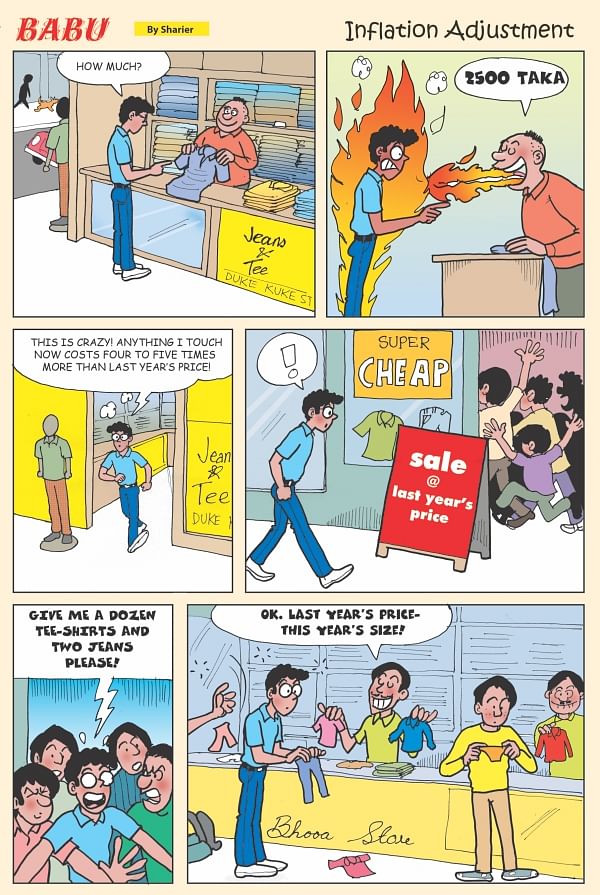
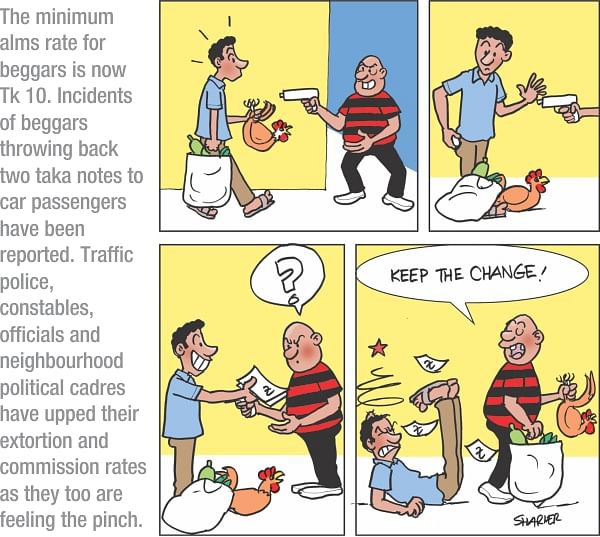
 The rich, usually immune to inflationary pressures, are also making changes. “I have decided to forgo a third Mercedes,” says Ujuira Begum, the wife of business tycoon Ameer Al Islam (Bekoop) of Bekoop and Sons Industries Ltd., “especially after my third driver quit, cribbing that they didn't have gas to cook food with while the borolok were practically choking on the substance… what a cheek! But I am not made of stone…”
The rich, usually immune to inflationary pressures, are also making changes. “I have decided to forgo a third Mercedes,” says Ujuira Begum, the wife of business tycoon Ameer Al Islam (Bekoop) of Bekoop and Sons Industries Ltd., “especially after my third driver quit, cribbing that they didn't have gas to cook food with while the borolok were practically choking on the substance… what a cheek! But I am not made of stone…” 

 Gemini - The Twins look quite unlike each other and sit with their backs to the other. The reason of course is an old fight about whose personality should be allowed to rule. Both think they are going to win over public hearts this year. “I love my people, they will vote me to power,” says one when the other cuts her short, “I am the fairer one, so obviously everyone loves me (especially Bangladeshis). So I will go to power.” And they keep on quarrelling about this issue till this correspondent gave up trying to pacify them and left.
Gemini - The Twins look quite unlike each other and sit with their backs to the other. The reason of course is an old fight about whose personality should be allowed to rule. Both think they are going to win over public hearts this year. “I love my people, they will vote me to power,” says one when the other cuts her short, “I am the fairer one, so obviously everyone loves me (especially Bangladeshis). So I will go to power.” And they keep on quarrelling about this issue till this correspondent gave up trying to pacify them and left. 
 Leo – “Do you know how lowly they treat me at your zoo? I am the king of the jungle. Not that striped beast you call Royal Bengal Tiger. Now tell me if he is so special, why doesn't he have a Zodiac sign named after him?” the Lion questions with a deafening roar. His anger is justified though, with world power shifting towards the East, it is rumoured that the Lion may soon lose his place to the Tiger, whose symbol is found in the Chinese horoscope.
Leo – “Do you know how lowly they treat me at your zoo? I am the king of the jungle. Not that striped beast you call Royal Bengal Tiger. Now tell me if he is so special, why doesn't he have a Zodiac sign named after him?” the Lion questions with a deafening roar. His anger is justified though, with world power shifting towards the East, it is rumoured that the Lion may soon lose his place to the Tiger, whose symbol is found in the Chinese horoscope.  Virgo – After a long five-hour wait, intercepted every now and then with short messages sent with tea and snacks through the butler from the inner quarters, the Maiden, beautiful as ever in a gorgeous dress and flawless, translucent make up, made her entry into her perfectly decorated living room, where this correspondent was snoring comfortably on the couch. The interview could not be conducted as this correspondent was immediately thrown out of the house. It was not known what set off the Maiden's temper — the drool marks on the silk cushion or the biscuit crumbs on the Persian carpet.
Virgo – After a long five-hour wait, intercepted every now and then with short messages sent with tea and snacks through the butler from the inner quarters, the Maiden, beautiful as ever in a gorgeous dress and flawless, translucent make up, made her entry into her perfectly decorated living room, where this correspondent was snoring comfortably on the couch. The interview could not be conducted as this correspondent was immediately thrown out of the house. It was not known what set off the Maiden's temper — the drool marks on the silk cushion or the biscuit crumbs on the Persian carpet.  Libra – The Scale was seen lying in neglect in one corner of the city's wholesale bazaar. “This is the treatment you get in digital Bangladesh. No regard for tradition and values. I heard even the blindfolded lady at the court buildings has applied for one of those digital weighing machines. What the world has come to,” he says in a melancholy tone.
Libra – The Scale was seen lying in neglect in one corner of the city's wholesale bazaar. “This is the treatment you get in digital Bangladesh. No regard for tradition and values. I heard even the blindfolded lady at the court buildings has applied for one of those digital weighing machines. What the world has come to,” he says in a melancholy tone. Scorpio – It was a telephonic interview as this correspondent couldn't risk a possible scorpion bite. “My plans? I don't have any? I do however want to make a Dhallywood movie 'Bise bish' or 'Poisonous Twenty' about the twenty top deadliest things on earth. Of course I will be number one,” says the Scorpion with a boastful air. “It is so silly that Dhallywood fantasy movies use snakes for the poisonous climax. Had they googled it properly they would know who rules,” he hisses.
Scorpio – It was a telephonic interview as this correspondent couldn't risk a possible scorpion bite. “My plans? I don't have any? I do however want to make a Dhallywood movie 'Bise bish' or 'Poisonous Twenty' about the twenty top deadliest things on earth. Of course I will be number one,” says the Scorpion with a boastful air. “It is so silly that Dhallywood fantasy movies use snakes for the poisonous climax. Had they googled it properly they would know who rules,” he hisses. Sagittarius – “I don't want to restrict my market to Cupids only. I believe bow and arrows have a lot more potential than just being Cupid's toy. In fact, there should be a whole battalion of archers, say a Rapid Archer Battalion. I am planning to send a proposal to government regarding that. Arrows are more effective than pepper spray. It can also play a big role in reducing violence and saving foreign currency. I urge the student wings of political parties to use bow and arrow instead of foreign made guns and display their patriotism to the nation,” the ambitious and confident Archer jabbers away without pause.
Sagittarius – “I don't want to restrict my market to Cupids only. I believe bow and arrows have a lot more potential than just being Cupid's toy. In fact, there should be a whole battalion of archers, say a Rapid Archer Battalion. I am planning to send a proposal to government regarding that. Arrows are more effective than pepper spray. It can also play a big role in reducing violence and saving foreign currency. I urge the student wings of political parties to use bow and arrow instead of foreign made guns and display their patriotism to the nation,” the ambitious and confident Archer jabbers away without pause.  Capricorn – “Since road accidents have surpassed launch accidents I have stopped making it to the head lines,” says the Goat with a big sigh. “If the government changes along with the Shipping Minister, I might get back my glory,” he sounds hopeful. When asked about Eid-ul-Azha, he demanded that government should immediately ban import of all foreign products including Arab camels and Indian goats. “We need to practise patriotism in all walks of life and sacrifice,” he says.
Capricorn – “Since road accidents have surpassed launch accidents I have stopped making it to the head lines,” says the Goat with a big sigh. “If the government changes along with the Shipping Minister, I might get back my glory,” he sounds hopeful. When asked about Eid-ul-Azha, he demanded that government should immediately ban import of all foreign products including Arab camels and Indian goats. “We need to practise patriotism in all walks of life and sacrifice,” he says.
 Pisces – It was difficult to get hold of the Fish for an interview. Caught at last, she admits that she is too shy to say anything in public. After much convincing she says with a heavy heart how she is becoming less known among the common populace. “The other day I overheard a child who sells books containing my picture, at the traffic signal, ask her companion about me. She said that she had not seen me in any of the cages when she went to sell sweets at the Dhaka Zoo couple of days back,” relates the Fish in a choked voice, becoming too emotional to say anything more.
Pisces – It was difficult to get hold of the Fish for an interview. Caught at last, she admits that she is too shy to say anything in public. After much convincing she says with a heavy heart how she is becoming less known among the common populace. “The other day I overheard a child who sells books containing my picture, at the traffic signal, ask her companion about me. She said that she had not seen me in any of the cages when she went to sell sweets at the Dhaka Zoo couple of days back,” relates the Fish in a choked voice, becoming too emotional to say anything more. 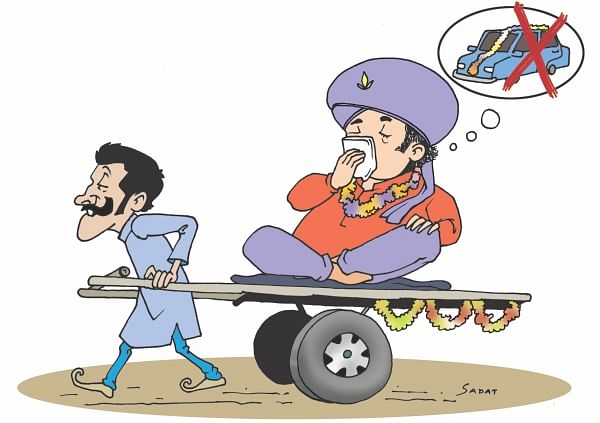
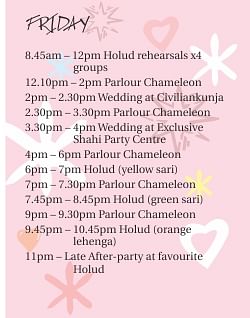 The Elusive Wedding Dancer
The Elusive Wedding Dancer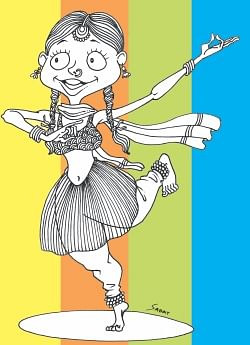 Not even before I can sit down and order myself a caffeine pick-me-up, Komola recites her schedule and I've already lost my will to live. I promptly follow her out at 8.40am and within 10 minutes, I am watching her dominate, I mean, lead a dance rehearsal for her sister's colleague's niece's holud, to be held that evening.
Not even before I can sit down and order myself a caffeine pick-me-up, Komola recites her schedule and I've already lost my will to live. I promptly follow her out at 8.40am and within 10 minutes, I am watching her dominate, I mean, lead a dance rehearsal for her sister's colleague's niece's holud, to be held that evening.